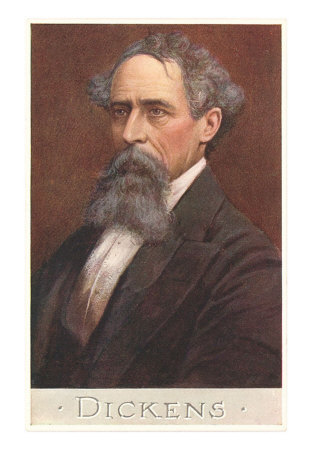
CHARLES DICKENS' ENGLAND
(UK, 2009, d. Julian Richards)
This film was produced by Sky Arts (which to many may seem an oxymoron!). Probably the best place to see it is in the school theatre or on television.
In some ways it is a terrible film, how not to make a documentary. Yet, I don't begrudge the time I spent watching it because I did see and learn a lot about Dickens and, despite the screenplay, it gets you thinking about Dickens, about writing, about his public, about his times and about social issues. So, it couldn't be all bad.
We are informed about Dickens from his birth to his death and most events in-between. We are also taken to so many of the places where he lived, worked and wrote. We are told about all his writing (though I don't think there was a reference to Hard Times) and it is interesting to reflect about the age at which he wrote his novels and what life experience he brought to them. Pickwick Papers was first. Oliver Twist and Nicholas Nickleby were early while A Tale of Two Cities and Great Expectations came later.
We also discover how much he used the towns of Kent where he lived and returned to as well as the details of locations in London where he lived and worked. We also discover some of the real people on whom he based his characters: his first love, Maria, as Estella, his father as Mr Micawber, a lady living on the coast as Betsy Trotwood.
Then, what is the problem? The screenplay is often mundane when it could have benefited from some of Dickens' wit and insights. The glimpses of particular locations are often just that bit too quick and we are off to the next one, trying to assimilate why we have been looking at the previous place, building, coastal scene, overview of Chatham or Rochester or what. There will be an advantage in having the DVD and going back quickly to make sure.
The main difficulty, which should have been a surefire selling point, is the presence of Derek Jacobi as presenter and guide. He is at his most histrionic (including when he reads sections from Dickens' writings and his books). The director has made him get in and out of cars a lot, knocking on doors, going in doors, coming out doors. But, his manner has more than a touch of the supercilious. He gives the audience knowing looks, or raises his eyebrows while offering some arch comment – the editor not cutting away quickly enough so that he is left looking quizzical so that the audience has to deal with Sir Derek as well as Dickens.
There are some interesting interviewees like Roy Hattersley talking about the social and parliamentary aspects of the times, Adrian Wooten offering detail of Dickens' life in London, and Dr Tony Williams and other experts as well as the various caretakers and custodians of Dickens' houses and museums, some of whom may have felt awkward in the situation but are make to look awkward.
But, having said that, the makers have put a lot of effort into research and filming and (while many film critics amongst the audience were matching Derek Jacobi's supercilious tone with their own superior, knowing and supercilious laughter – though they toned down eventually and stayed until the end), it is a very informative film about one of England's greatest writers who was successful as a populist, a performer and someone who alerted people and government about needs for social reform.